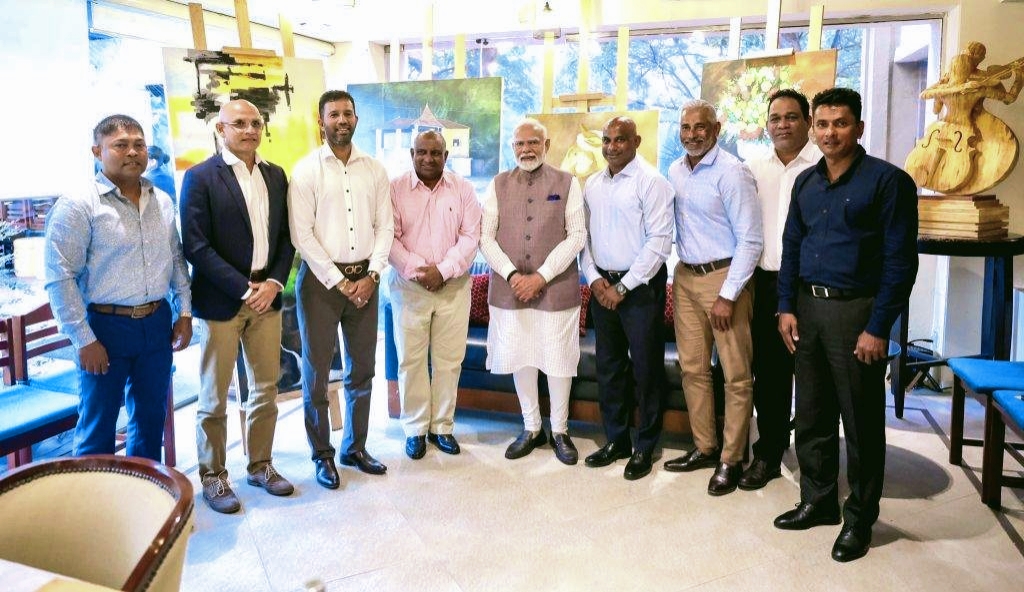Colombo, Sri Lanka – On April 5, 2025, Prime Minister Narendra Modi met with members of the 1996 Sri Lankan Cricket Team in Colombo, an interaction that blended nostalgia with a reaffirmation of India’s commitment to its neighbors. The meeting, held a day before its official announcement by the Press Information Bureau (PIB) on April 6, brought together the Indian leader and the cricketing legends who clinched the World Cup nearly three decades ago, leaving an indelible mark on the sport’s history. The candid exchange highlighted not only shared cricketing memories but also the deep ties between India and Sri Lanka, underscored by Modi’s emphasis on India’s ‘Neighbourhood First’ policy.
The 1996 Sri Lankan team, celebrated for their groundbreaking victory, expressed delight at meeting Modi, who reciprocated their enthusiasm. “The Indian people still remember the team’s impactful performance, particularly the memorable victory that left a lasting impression,” Modi said, noting that their triumph continues to echo across the subcontinent. He reminisced about attending a match in Ahmedabad in 2010, where he spotted one of the Sri Lankan players serving as an umpire—a testament to their enduring connection to the game. Modi drew parallels between India’s 1983 World Cup win and Sri Lanka’s 1996 triumph, describing both as transformative moments that reshaped cricket globally. He credited the Sri Lankan team’s innovative approach in 1996 with laying the groundwork for the evolution of T20 cricket, a format that has since revolutionized the sport.
The conversation turned reflective as Modi inquired about the players’ current pursuits, asking whether they remain involved in cricket through coaching or other roles. The exchange offered a rare glimpse into the personal rapport between the Prime Minister and the cricketers, many of whom have transitioned into influential positions within the sport. Among them was Sanath Jayasuriya, the current coach of the Sri Lankan men’s cricket team, whose remarks added a contemporary layer to the dialogue.
Modi also revisited a pivotal moment in India-Sri Lanka relations: India’s decision to tour Sri Lanka in 1996 despite bomb blasts that prompted other teams to withdraw. “The Sri Lankan players appreciated India’s solidarity during their difficult times,” he noted, framing it as an example of sportsmanship triumphing over adversity. He connected this historical gesture to his own visit to Sri Lanka after the 2019 church bombings, when he became the first global leader to travel there in the aftermath, followed closely by the Indian cricket team’s tour. “India stands by Sri Lanka in both joy and sorrow,” Modi emphasized, presenting this consistency as a reflection of India’s core values and its role as a reliable partner.
Jayasuriya, in turn, expressed gratitude for India’s support during Sri Lanka’s recent financial crisis, a period that tested the island nation’s resilience. He seized the opportunity to pitch a proposal, asking Modi to explore the feasibility of establishing a cricket ground in Jaffna capable of hosting international matches. Such a facility, he argued, would uplift aspiring cricketers and the broader community in Sri Lanka’s north-eastern region, an area still recovering from decades of conflict. The request underscored the intersection of sport and socio-economic development, a theme that resonated with Modi’s broader remarks.
Responding to Jayasuriya, Modi reiterated India’s commitment to its ‘Neighbourhood First’ policy, a cornerstone of its foreign relations framework. “India is the first responder to crises in neighboring countries,” he said, citing the recent earthquake in Myanmar as an example of India’s swift action. He framed this responsiveness as a responsibility rather than an obligation, emphasizing India’s proactive stance in supporting friendly nations. Turning to Sri Lanka’s economic challenges, Modi highlighted India’s consistent assistance, including financial aid and development projects, as part of its duty to help the neighbor overcome adversity. He welcomed Jayasuriya’s suggestion about Jaffna, assuring that his team would assess its viability. “We will take note of this and explore how it can be done,” Modi promised, signaling openness to the idea without committing outright.
The Prime Minister also announced several new projects during the interaction, though specifics were not detailed in the PIB release. These initiatives, he suggested, would further strengthen the bilateral relationship, building on a foundation of mutual trust and cooperation. Modi’s appreciation for Jayasuriya’s focus on Jaffna hinted at a potential alignment with India’s broader developmental goals in the region, where infrastructure and opportunity remain critical needs.
The meeting concluded on a warm note, with Modi expressing gratitude for the chance to reconnect with the 1996 team. “It’s a pleasure to relive old memories and see familiar faces,” he said, blending personal sentiment with diplomatic goodwill. He pledged his full support for any initiatives proposed by the Sri Lankan cricket community, reinforcing the idea that the ties between the two nations extend beyond politics into the cultural and sporting realms.
This interaction in Colombo came amid a busy period of international engagement for Modi, yet it stood out for its blend of nostalgia and policy substance. The 1996 Sri Lankan team’s victory, achieved under the leadership of Arjuna Ranatunga and powered by players like Jayasuriya, remains a touchstone in cricket lore, celebrated for its audacious style and underdog spirit. Modi’s invocation of that legacy served not only to honor the players but also to frame India’s relationship with Sri Lanka as one rooted in shared history and mutual upliftment. As the Prime Minister departed, his words left an impression of continuity—between past glories and present partnerships, and between cricketing camaraderie and geopolitical solidarity.


